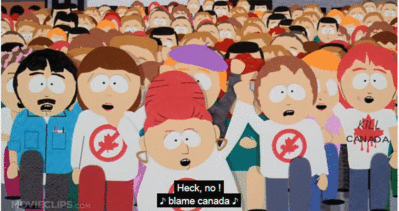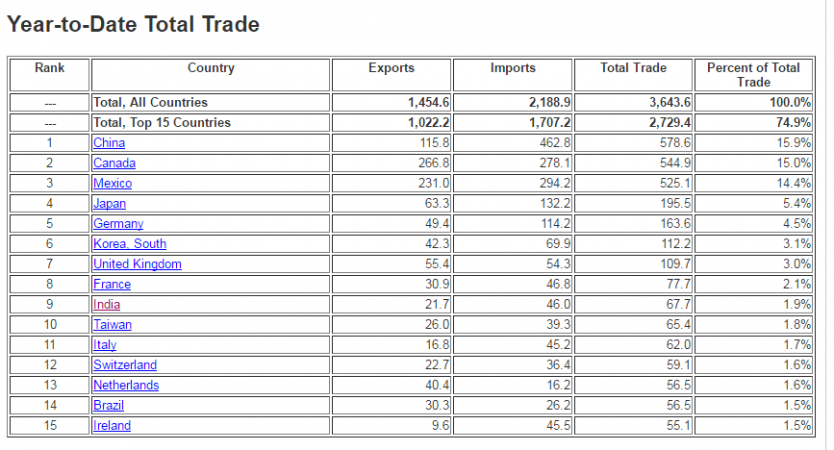
Posted on 06/01/2018 7:32:33 AM PDT by caww
President Trump criticized Canada on Friday for being “highly restrictive on trade” and accused the U.S. ally of treating the agriculture sector “very poorly.”
“Canada has treated our Agricultural business and Farmers very poorly for a very long period of time. Highly restrictive on Trade! They must open their markets and take down their trade barriers! They report a really high surplus on trade with us. Do Timber & Lumber in U.S.?” Trump tweeted.
Trump said in a statement Thursday the U.S. would only “agree to a fair deal” with Canada.
(Excerpt) Read more at washingtonexaminer.com ...
Educate yourself, Mark.

Seems the President didn’t get the memo. America is supposed to be the world’s doormat.
How big a market is Canada for U.S. products anyway?
It has a population comparable to California's, living on one of the largest land masses in the world.
“It has a population comparable to California’s,”
Kali is about the 7th largest GDP regions in the world, so, yeah, Canada is big enough to worry about.
Why are you trying to dismiss Canada’s actions against the United States by trying to trivialize it??
You left out the second part of my statement -- about the land area of Canada. It's a small population on a huge land mass. Its economy is disproportionately tied to natural resources; these types of countries will almost always have trade surpluses with wealthy trading partners.
Why are you trying to dismiss Canada’s actions against the United States by trying to trivialize it??
What "actions" are you talking about?
The subject of this thread is the U.S. actions against Canada. Or did I miss something?
Who cares how spread out they are. Kali isn’t exactly a tiny State either.
Canada is an ally in war so we are supposed to do whatever they say on trade. /s
We’re just picking on poor ol’ Canada. /s
We export more to Canada than any other single country in the world, i.e., $268 billion topped only by our total exports to the EU of $270 billion (2016 figures). We import $278 billion from Canada.
Canada is our third largest trading partner (exports and imports) after the EU and China.

Canada and Japan (for example) are very different trading partners -- and their population density is a big factor in that.
I find it hard to believe any U.S. political leader would even waste his time dealing with a $10 billion annual trade deficit with another country.
Your argument still has no merit on the issue of tariffs. They charge them, so we can charge them.
Apologies... but caww.. please update me on this currant situation.. I am traveling between Kyoto and Tokyo/Chiba now..
I heard the PANSY/PANZY leader of Canada was wee wee’d off about what Trump had done with NAPA.. and wanted to extend the ‘damage’ back toward the states by x10 (or something like that..).. Will it do actual damage back in the states?
(Apologies.. am in a net cafe now).
Among other things, I had to procure a few times some industrial items needed for emergency repair. One time, I had to acquire replacement elements for some common cartridge filters. Not exactly an exotic item. The regional supplier had a 2 week delivery time for common filters and played dumb on even able to supply the specialty filter cartridges I needed. Price was 50% greater than USA retail. I was pretty cranky so contacted the USA manufacturer and via their website was able to purchase at USA retail and the 2-day shipping fee included customs fees. Easy. The next time I had a mechanical failure with a large activated carbon system. Turned out that an inexperienced engineer had saved a few bucks by using PVC plastic internal parts instead of 316 stainless and the PVC failed. I called the USA manufacturer directly and they shipped the parts air freight the same day. Import tariffs were applied to both of these 2 examples.
I can attest to the fact that their Customs officers at Toronto Airport can make the Gestapo look like a Boy Scout Troop. We had a company conference there, bringing thousands of US $’s into the economy, and had most of the attendees, from Europe and the USA, interrogated for upwards of an hour each. Haven’t had one there since.
It has to do with the renegotiation of NAFTA, which includes Mexico as well as Canada. We are running a $63 billion trade deficit with Mexico.
Canada and Mexico are used by China to funnel their steel, aluminum, and other produsts thru those countries to avoid tariffs.
In its current form NAFTA became an exploited doorway into the coveted U.S. market. Asian economic interests, large multinational corporations, invested in Mexico and Canada as a way to work around any direct trade deals with the U.S. By shipping parts to Mexico and/or Canada; and by deploying satellite manufacturing and assembly facilities in Canada and/or Mexico; China, Asia and to a lesser extent EU corporations exploited a loophole.
Through a process of building, assembling or manufacturing their products in Mexico/Canada those foreign corporations can skirt U.S. trade tariffs and direct U.S. trade agreements. The finished foreign products entered the U.S. under NAFTA rules. This exploitative approach, a backdoor to the U.S. market, was the primary reason for massive foreign investment in Canada/Mexico; it was also the primary reason why candidate Donald Trump, now President Donald Trump, wanted to shut down that loophole and renegotiate NAFTA.
Why ship directly to the U.S., or manufacturer inside the U.S., when you could just assemble in Mexico and Canada and use NAFTA to bring your products to the ultimate goal, the massive U.S. market?
All nuanced trade-sector issues put aside, the larger issue is always how third-party nations will seek to gain access to the U.S. market through Canada and Mexico. [It is the NAFTA exploitation loophole which has severely damaged the U.S. manufacturing base.] President Trump, Secretary Wilbur Ross and U.S.T.R. Lighthizer well understand this structural problem. ONLY Trump, Ross, Mnuchin and Lighthizer were willing to confront this problem. If Trump had lost the election, Clinton would have joined the multinationals and U.S. workers would have suffered greatly.
The issue of Canada/Mexico making trade agreements with other nations (especially China), while brokering their NAFTA position with the U.S. as a strategic part of those agreements, is a serious issue that could not adequately be resolved while U.S. remains connected to NAFTA. With the tax reform benefits, American workers are realizing they are getting more money in their paychecks; and as the U.S. economy continues to gain momentum.
The Automobile Sector is one of the biggest points of contention within varying trade negotiations. In the NAFTA discussion the auto-sector, via rules of origin, runs at the heart of NAFTA’s fatal flaw. The fatal flaw = use of Asian, mostly Chinese, auto components within auto manufacturing. Mexico and Canada arguing to allow more Chinese auto parts in North American manufacturing; and President Trump demanding more North American parts for North American auto manufacturing.
The auto-sector is representative of much of the manufacturing exploitation by multinational corporations beyond vehicle production. China has supported the exploitation because they produce the components for multiple sectors (furniture, appliances etc). The auto-sector is much more than just complete assembled vehicles. In many ways the core trade issues of part origination, manufacturing and assembly of multiple durable goods sectors are represented within the auto industry process.
Current trade negotiations with the EU, China and NAFTA reached a loggerhead status around these core issues. Multinational ‘Wall Street’ corporations unwilling to lose their prior multi-billion investments and take a new ‘America-First’ approach. POTUS Trump is rightly angered by many of them because he specifically offset any investment losses with a new U.S. corporate tax structure.
All of that said, the issues with the auto-sector have now rippled out into other trade sectors with discussions coming to a standstill until the auto issues are resolved. Enter President Trump and Commerce Secretary Wilbur Ross with the plan.
Knowing all of the outlier, generally lesser, trade sectors are being impacted over the Chinese auto component issue, President Trump cuts the Gordian Knot and tells Commerce Secretary Wilbur Ross to consider a Section 232 review of auto industry as it pertains to imports.
Additionally, amid ongoing trade stalemates with NAFTA and the EU, Commerce Secretary Wilbur Ross has announced the U.S. Commerce Department will no longer provide Steel and Aluminum tariff exemptions for the European Union, Canada or Mexico. During a telephone briefing with reporters today Secretary Ross announced at midnight tonight the 25% steel, and 10% aluminum, tariffs on imported goods will begin.
Australia, Brazil and South Korea (KORUS) have completed trade agreements with the U.S. and will remain exempt from any countervailing steel and aluminum duty. However, Canada and Mexico (NAFTA), as well as the EU, have been unwilling to reach reciprocal and balanced trade agreements with the U.S. and will now be subject to the tariff.
As a Canadian what I understand, and I use to know the exact numbers, but the US does subsidize US agriculture. Canada subsidizes at approximately twice the rate as US subsidies. Europe might be 3 to 4 times US subsidies. And Japan subsidizes at some insane rates. Rice is at 800 percent or something like that.
Canada also does what is neatly calls supply management, which is just another word for enforcing egg, milk and cheese fixes on production levels.
Disclaimer: Opinions posted on Free Republic are those of the individual posters and do not necessarily represent the opinion of Free Republic or its management. All materials posted herein are protected by copyright law and the exemption for fair use of copyrighted works.